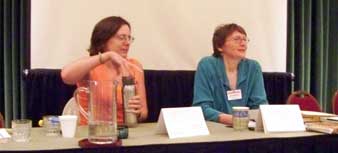Readercon — Sunday, July 20th…
[Note: We didn’t get in until 3:30 am Monday morning so things were a bit strange today catching up and getting our mail from the post office, unpacking, and not having anywhere near enough spoons to last the day–so this post is a bit late.]
We need to check out today before the convention ends so we’re up and getting packed. I’m going to enter the panels that I will be at this morning and afternoon and then add the detail later. After the convention we intend to drive to Providence, RI to visit my son Geoff for an hour or so before heading out for Maryland and home. Today is going to be a long day for us. So far, we’ve packed most of the room and I’m writing this while getting my first cup of coffee.

10:00 am The Aesthetics of Online Magazines. Leah Bobet, Ellen Datlow, Ernest Lilley, Nick Mamatas (L), Sean Wallace. Online magazines are a growing section of the speculative fiction marketplace. But is there more to an online magazine than simply publishing in pixels stories that would otherwise be printed on pulp? How have online magazines adapted to the new medium in terms of story subjects, story length, design, and the attraction and maintenance of audiences? How do these choices differ from those made by print magazines producers? If the medium is the message, then what is the message of Internet-based magazines?
Discussion covered screen sizes, whether people would read stories longer than 5,000 words (studies show they don’t but studies also show they don’t read longer stories in print magazines either), the problem of moving from print to screen, whether it was time to change from straight narrative to hyper-stack stories, and so on and so on. Basically, all the problems and possibilities were discussed but no set of recommendations were formed only more issues to consider.

12:00 (noon) You Got Spec Fic in My Romance! (And Vice Versa!) Victoria Janssen (L), Nina Harper, Mary Kay Kare, Terry McGarry, Gayle Surrette, Nancy Werlin) Discussion. One of the hottest romance sub-genres at the moment is paranormal, which encompasses everything from vampires to valkyries, werewolves to gargoyles, men who are cursed and women who carry demons on their skin. Many of the more recent paranormals, such as those by Patricia Briggs and Eileen Wilks, arguably have more fantasy then romance. Is paranormal “true” speculative fiction? How often do readers cross genres? Are Paranormal romances and speculative fiction showing cross-genre pollination in their content?
What is paranormal romance? How does it differ from Romance? How does it differ from fantasy or science fiction? What makes a paranormal romance (romance, fantasy/sf/horror, story, strong characters, good writing)? Lots of lively discussion about what the panel and the audience liked. I was on this panel but there was just so much to talk about — it’s a big area and still doesn’t yet have its parameters carved in stone. What is paranormal romance to you? I’d love to hear about it.

2:00 Magic and Myth in Human Culture and Fantastic Fiction. Judith Berman & Sarah Micklem with discussion by Andrea Hairston, Elaine Isaak, Michaela Roessner, Sarah Smith, Gayle Surrette, Sonya Taaffe, Ann Tonsor Zeddies, et al. Talk/Discussion. Within our cultures, humans create consensus views of what is real and what is not, and these views are both explanations and operational (curses, oracles, germs, electricity). The modern scientific model of reality excludes the beliefs and experiences of many people around the world, not to mention in most of human history. How do we, as writers, step outside our own worldview to create imaginary cultures in which magic is a fact of life? Berman will talk about anthropological understandings of magic and myth, and issues of authenticity and appropriation, while Micklem will share some sources, primary and anthropological, that influenced her own fiction.
Micklem and Berman discussed culture, folk tales, charlatans, pragmatism, magic/reality, mind/body, and other issue. How to make a consistent, working system for world-building — it’s more than saying magic exists. You have to deal with magic as an intricate part of the lives, beliefs, and culture of the people of your world. Lots of audience participation and discussion. This could have been a lot longer session and still it would have just skimmed the surface. I really learned a lot from this one.
After this panel, we hopped in the car and started for Providence. Paul and Ern had packed the car while I was in the last panel session since the Dealers’ Room closed at 2pm. [Hyperion here: Just closed the back hatch when it started to rain. So I got wet, but none of the book boxes did.] We spent about 2 hours in Providence — took my son out to supper and caught up on what he’s doing and the family. Then it was back in the car for the drive to Maryland. We managed to drive all the way in one go (with stops for bathroom, coffee, and stretches). We’d planned to swap off the driving among the three of us but forgot to leave room to move the driver’s seat back so that Ern could do his share of the driving (his knees hit the dashboard (what were we thinking– it was a long weekend). But we managed to get into MD about 3:30 am. We simply crashed and slept and Ern headed home after helping Paul unload the car.
We declared Readercon lots of fun. Had a great time talking to friends new and old. We’re already looking forward to next year.




